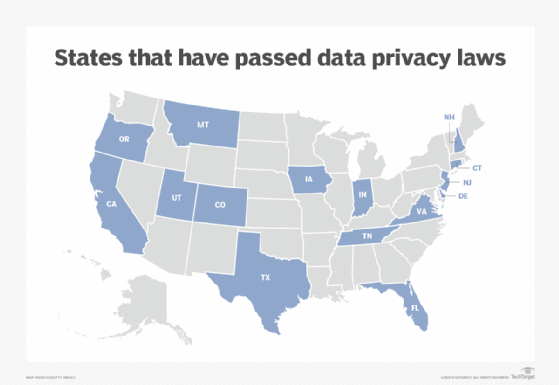
peach_fotolia - stock.adobe.com
Why does data privacy matter in marketing?
Marketers frequently use customer data for their strategies. They must properly secure that information, so they comply with privacy laws and customers trust the business.
While the digital landscape continues to evolve, the importance of data privacy in marketing becomes more critical.
As states and countries roll out data privacy and protection laws, such as GDPR in the EU and CCPA in California, consumers become more aware of their own data privacy online and are more protective of it. Because of this awareness, businesses have begun to change how they collect and store customer data to comply with regulations and ensure consumers can trust them.
Additionally, marketers continue to change their campaigns and data privacy policies in response to the deprecation of third-party cookies and new authentication standards from major email platforms. Within these new strategies, they should also plan to evolve their practices as more regulations roll out to protect consumer data privacy.
What is data privacy?
Data privacy, also known as information privacy, refers to the proper handling, processing, storage and protection of personal information to keep it secure from unauthorized access and misuse. Personal information includes anything that can identify an individual, such as names, addresses, phone numbers, email addresses, social security numbers and financial details.
The core principles of data privacy revolve around the following aspects:
- Consent. Individuals should have control over their personal data, including the right to give explicit permission for its collection and use.
- Transparency. Organizations must be clear and open about how they collect, use and share personal data.
- Data minimization. Organizations should only collect and process the necessary amount of personal data for a specific purpose.
- Security. Business should implement security measures to protect personal data from breaches, theft or unauthorized access.
- Compliance. Organizations should adhere to relevant laws and regulations governing data privacy, such as GDPR, CCPA and others.
Data privacy concerns in marketing have evolved significantly with technological advancements. Before the digital boom, data privacy was not a major issue, as marketing relied on mass media with minimal personal data collection. However, the rise of digital marketing in the 1990s introduced significant privacy issues, leading to the introduction of data protection laws like the EU's Data Protection Directive.
Then, the early 2000s saw a significant rise in e-commerce and the use of cookies to track user behavior, which raised further privacy concerns and the need for better data protection measures.
The 2010s brought a surge in personal data collection through social media and mobile devices, and high-profile privacy breaches highlighted the need for stricter regulations. The EU continued to push for data privacy with GDPR in 2018. This legislation marked a significant shift, as it set stringent privacy requirements and created a new awareness of privacy from consumers and other government bodies.
Data privacy is now a central concern for organizations, and marketers have begun to adopt privacy-first approaches that focus on transparency, consent and ethical data use to stay compliant with evolving regulations and protect personal information.

What marketers must consider for data privacy
Legal and marketing teams must work together to evaluate the changing laws and how they want to collect, store and use customer data in their strategies. Key regulations such as GDPR and Domain-based Message Authentication, Reporting and Conformance (DMARC) play a pivotal role in shaping data practices.
General Data Protection Regulation
GDPR, implemented by the European Union in 2018, sets comprehensive guidelines for data protection and privacy. It mandates that businesses obtain explicit consent before collecting personal data and clearly explain how they plan to use that data. Failure to comply with GDPR can result in hefty fines and damage to a company's reputation.
Domain-based Message Authentication, Reporting and Conformance
DMARC is an email authentication protocol that helps protect domains from email spoofing and phishing attacks. For marketers, adhering to DMARC standards ensures their email campaigns reach recipients securely to maintain trust and protect the brand's reputation.
California Consumer Privacy Act
CCPA, effective from January 1, 2020, enhances privacy rights and consumer protection for California residents. It grants consumers rights, such as knowing what personal information is collected, deleting personal data and opting out of data sales. For marketers, compliance with CCPA, like the other regulations, can help avoid legal issues and maintain trust.
Pros and cons of data privacy
Organizations should prioritize data privacy in marketing to remain compliant with government regulations and gain trust from consumers, but implementing a new privacy strategy can bring about various new challenges.
The benefits include the following:
- Enhanced customer trust. By prioritizing data privacy, organizations can build stronger relationships with customers and foster loyalty and trust.
- Compliance and avoidance of penalties. Adhering to regulations such as GDPR helps organizations avoid legal penalties and fines.
- Improved data quality. Focusing on first-party data collection ensures marketers gather more accurate and reliable information.
The challenges include the following:
- Increased operational costs. Data privacy measures can be expensive and resource intensive.
- Limited data availability. Stricter privacy laws may limit the amount of data marketers can collect and analyze.
- Complexity in compliance. Marketers may struggle to navigate the various global privacy regulations -- especially those operating in multiple regions.
8 best practices for data privacy
Modern marketers must implement effective security and privacy practices into their campaigns. Some best practices to implement data privacy in marketing include the following:
1. Include opt-in options
Ensure customers provide explicit consent before collecting their data. Opt-in options for newsletters, promotions and data collection can build trust and demonstrate respect for their privacy.
2. Collect first-party data
Gather data directly from customers through surveys, interactions and direct engagement. First-party data is typically more reliable and aligns better with privacy regulations.
3. Be transparent with customers
Clearly communicate how the business collects, stores and uses personal data. Transparency helps build trust and ensures customers understand their rights.
4. Regularly update privacy policies
Stay informed about changes in privacy laws and update policies accordingly. Make sure users can easily access the privacy policy and that it is written in plain language.
5. Implement strong security measures
Protect collected data with strict security measures, including encryption, regular security audits and compliance with industry standards.
6. Minimize data collection and retention
Collect only the data necessary for business operations and marketing efforts. Establish clear data retention policies so the business doesn't store personal data longer than required. Minimizing data collection reduces exposure to breaches and regulatory risks.
7. Conduct regular privacy training
Provide comprehensive and ongoing privacy training for staff. Ensure all employees understand the importance of data privacy, the relevant regulations and the organization's policies. Educated staff can handle data more responsibly and help prevent accidental breaches.
8. Perform data protection impact assessments
Regularly conduct data protection impact assessments to evaluate how data processing activities affect individuals' privacy. This practice helps identify potential privacy risks early and helps organizations address these risks proactively, ensure compliance with regulations and protect customer trust.
Data privacy in marketing requires a thoughtful and proactive approach. If marketers adhere to regulations, are transparent with customers and adopt best practices, they can navigate these complexities while fostering trust and loyalty among their audience.
Griffin LaFleur is a MarketingOps and RevOps professional working for Swing Education. Throughout his career, Griffin has also worked at agencies and independently as a B2B sales and marketing consultant.








